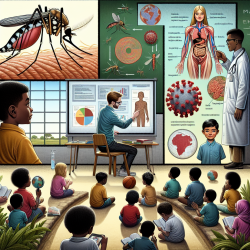Malaria remains a significant public health challenge in Africa, particularly for school-age children. The recent research article "Malaria in school-age children in Africa: an increasingly important challenge" by Nankabirwa et al. (2014) highlights the growing incidence of malaria in this age group and its adverse effects on health and education. This blog aims to provide practitioners with actionable insights to improve their skills and encourage further research in this critical area.
Key Findings and Implications
The study underscores several key points:
- Increased Incidence: As malaria control measures reduce transmission in younger children, school-age children are now experiencing more clinical attacks.
- Impact on Education: Malaria significantly affects school attendance and cognitive performance, leading to poorer educational outcomes.
- Low Use of Preventive Measures: School-age children are less likely to use long-lasting insecticide-treated bednets (LLINs), increasing their vulnerability.
Strategies for Practitioners
To address these challenges, practitioners can implement the following strategies:
- Promote LLIN Use: Educate school-age children and their families about the importance of using LLINs consistently.
- School-Based Health Education: Integrate malaria education into the school curriculum to raise awareness and promote preventive behaviors.
- Intermittent Preventive Treatment (IPT): Advocate for IPT programs in schools, which have shown to reduce malaria incidence and improve anemia and cognitive function.
Encouraging Further Research
While current strategies show promise, more research is needed to optimize malaria control in school-age children. Practitioners are encouraged to participate in or support studies that investigate:
- The effectiveness of different preventive measures in various settings.
- The long-term impact of malaria on cognitive development and educational attainment.
- Cost-effective methods for implementing school-based malaria interventions.
By staying informed and actively participating in research, practitioners can contribute to more effective malaria control strategies and improve health outcomes for school-age children in Africa.
To read the original research paper, please follow this link: Malaria in school-age children in Africa: an increasingly important challenge.










